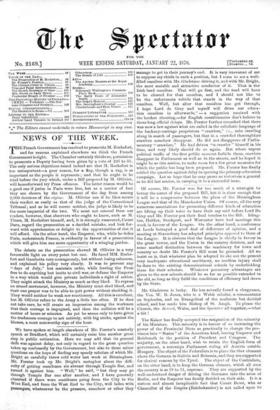We have spoken at length elsewhere of Mr. Forster's masterly
speech at Bradford, which will certainly raise him another great step in public estimation. Here we may add that its general drift was against delay, not only in regard to the great question taken up confessedly by the Government, but also to those minor questions on the hope of finding any speedy solution of which Mr. Bright so carefully threw cold water last week at Birmingham. Mr. Forster took up Mr. Bright's metaphor about the diffi- culty of getting omnibuses six abreast through Temple Bar, and turned it against him. " Well," he said, " but they may go through Temple Bar one after another, and I have generally observed if there were omnibuses going from the City to the West End, and from the West End to the City, well laden with Passengers, whatsoever be the pressure, somehow or other they manage to get to their journey's end. It is very irreverent of me to suppose my chiefs in such a position, but I seem to see a well- filled omnibus with Mr. Gladstone driving it, and with Mr. Bright, the most amiable and attractive conductor of it. That is the Irish land omnibus. That will go first, and the road will have to be cleared for that omnibus, and I should not like to be the unfortunate vehicle that stands in the way of that omnibus. Well, but after that omnibus has got through, I hope Lord de Grey and myself will drive our educa- tion omnibus in afterwards," — a suggestion received with the loudest cheering,—for English constituencies don't believe in these long official delays. Mr. Forster further remarked that there was now a law against what are called in the cabalistic language of the hackney-carriage proprietors "crawlers," i.e., cabs crawling along in search of passengers, but that in a crowded thoroughfare crawlers somehow disappear. He did not disapprove of Parlia- mentary " crawlers." He had driven "a crawler" himself in his time, and very likely should do so again. But where urgent political traffic of the first public moment forbids them, crawlers disappear in Parliament as well as in the streets, and he hoped it might be so this session, to make room fora few great measures for which the public has long been prepared. Mr. Forster has finally settled the question against delay in opening the primary-education campaign. Let us hope that he may prove as victorious a general as he did last session, in carrying it to a successful issue.


































